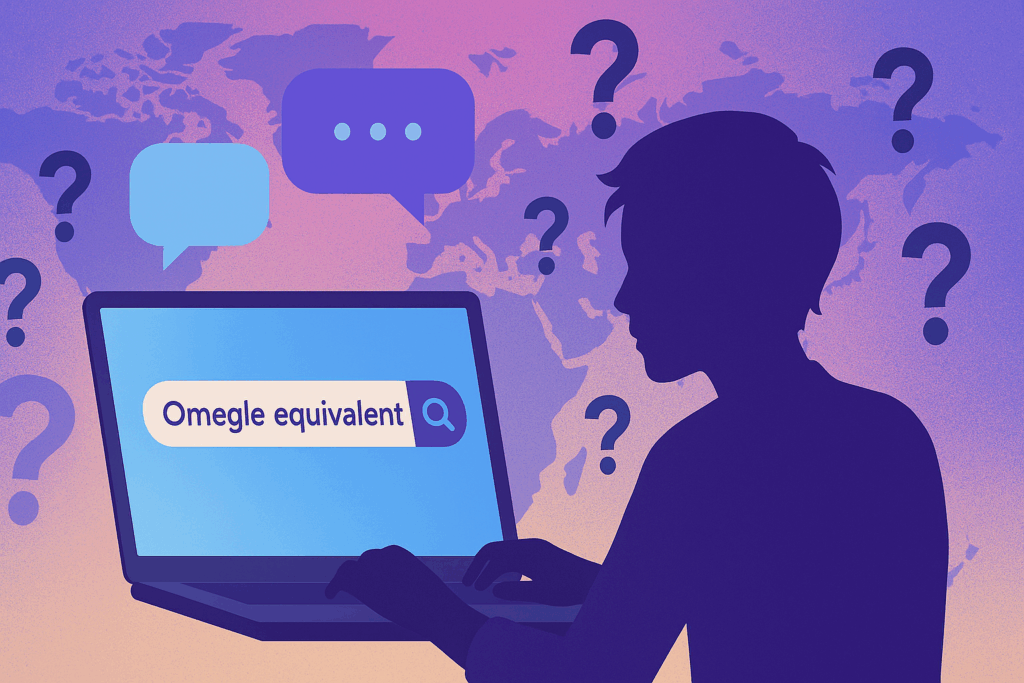Omegle Equivalent
Why People Hunt for an “Omegle Equivalent”
“Unfortunately, what is right doesn’t always prevail.”
— Leif K-Brooks, Omegle founder, announcing the site’s shutdown on Nov 8 2023 (Tencent RTC)
Random-chat culture didn’t vanish when Omegle’s servers went dark—it simply scattered. All across Reddit threads, Discord servers, and TikTok comment sections you’ll see the same question: “What’s the best Omegle equivalent?” Below, we’ll explore why that question matters so much—without actually listing any specific alternatives.

Curious where to click “Next” now? Dive into our in-depth roundup of the best Omegle alternatives to find safe, lively platforms you can join tonight.
1. The Magnetic Pull of Anonymous Video Chat
1.1 Spontaneity at Zero Cost
Omegle’s genius was its one-click-conversation design. No accounts, no bios, no algorithms—just “You” and “Stranger.” That friction-free onboarding set an expectation that any successor should feel equally instant.
1.2 Global Reach
From high-schoolers in São Paulo practicing English to retirees in Helsinki sharing chess tips, Omegle proved that a webcam could be a portal to the whole planet, not just a curated “friends” list.
1.3 Low-Pressure Socializing
When a chat soured, the big blue “Next” button offered painless escape. People who felt anxious on formal social networks found liberation in that ephemerality.
2. The Frictions That Sent Users Looking Elsewhere
Key insight: “Random chats, overcrowding, and inappropriate behavior have left many users dissatisfied.” (HitPaw)
2.1 Safety & Moderation Gaps
Anonymous spaces breed creativity—and exploitation. Parents, educators, and law-enforcement flagged Omegle for grooming risks, hate speech, and blackmail schemes. A 2022 BBC-referenced study showed half of all video chats contained sexual violence or hate speech (AirDroid), eroding trust and nudging cautious users toward better-policed platforms.
2.2 Privacy Concerns
Because no login was required, IP addresses became the de-facto identifier, making doxxing and location tracking possible. Analysts note that the platform’s data-retention policies were “murky” and that recorded video could be reused for extortion or deep-fake creation (amarinstructor.com). Users who once prized anonymity started demanding end-to-end encryption, virtual backgrounds, or at least clear data-deletion assurances.
2.3 Bot Fatigue & Content Quality
Spam links, cryptocurrency shills, and deep-fake “hey babe” clips flooded the feed in Omegle’s later years. When genuine connection is smothered by automation, people inevitably hunt for fresh spaces where the signal-to-noise ratio is higher.
3. The 2023 Shutdown: Catalyst for a Mass Exodus
On November 8 2023, Omegle pulled the plug, citing unsustainable moderation costs and mounting legal pressure tied to child-exploitation lawsuits (Tencent RTC). Overnight, millions of habitual night-owls lost their digital campfire—and Google Trends lit up with searches like “sites like Omegle,” “Omegle replacement,” and “next Omegle.”
4. Rising Expectations in 2025
| Old Norm (2009) | New Norm (2025) |
|---|---|
| 360p webcam | 1080p with AI noise suppression |
| One-to-one video | AR masks, avatar mode, group stages |
| Manual “Next” skip | Algorithmic match + toxicity filter |
| No profiles | Opt-in reputation scores |
Mobile-first Gen Z and Gen Alpha audiences expect video chat to look TikTok-polished, with immersive filters, swipeable UX, and native tipping systems. A plain HTML rectangle feels archaic—another prod to seek out “equivalents” that satisfy modern tastes.
5. Compliance, Liability & the Search for Safer Shores
Regulators from the EU’s Digital Services Act to state-level “Kids’ Code” bills impose age-verification, content-take-down, and transparency rules. Platforms that can’t afford compliance risk abrupt shutdowns—so users pre-emptively scout options that already advertise robust KYC, 24/7 human moderation, and AI child-safety scans.
Fact: Omegle cited “unspeakably heinous crimes” involving minors as a central reason for closing shop. (Tencent RTC)
6. Niche Communities & FOMO
Some ex-Omeglers don’t actually want a universal lobby. They crave topic-centric rooms—anime, chess, indie pop—or identity-safe spaces (LGBTQ+, neurodivergent, language-learning). As these micro-communities splinter across new domains, curiosity about every emerging “equivalent” spikes, lest one miss the next big hangout.
7. How Users Evaluate Potential Replacements
- Authentication Balance
- Anonymous login with optional social-media badge?
- Email-only signup?
- Moderation Transparency
- Is there a real-time content scorecard or safety dashboard?
- Privacy Engineering
- Does the platform mask IP by default?
- Are chats peer-to-peer (no central storage)?
- Feature Set
- Interest matching, text translation, AR filters, tipping?
- Community Health Metrics
- Daily active users, churn rate, bot detection ratio.
- Cross-Device Consistency
- Browser + iOS + Android parity, adaptive bitrate, low latency.
- Monetization Ethics
- Ads, freemium perks, or data brokerage?
Only after ticking these boxes do former Omegle fans commit to a new digital haunt.
8. Myth-Busting: “The Perfect Clone” Fallacy
No platform can replicate the exact cocktail of risk, freedom, and serendipity that defined Omegle circa 2012. Every so-called clone tweaks the anonymity dial, the safety net, or the profit model—fundamentally altering the vibe. Understanding this prevents disappointment and keeps expectations realistic.
Ready to Share Your Story?
Have you trekked through the post-Omegle wilderness? Found features you adore—or hazards you didn’t expect? Jump into the comments and drop your firsthand tips. Your experience could steer someone else toward a safer, more rewarding chat adventure.

